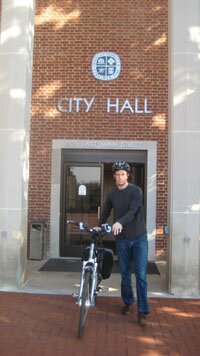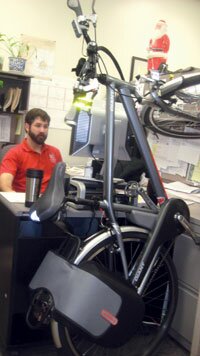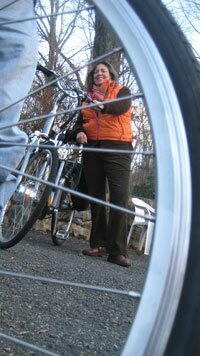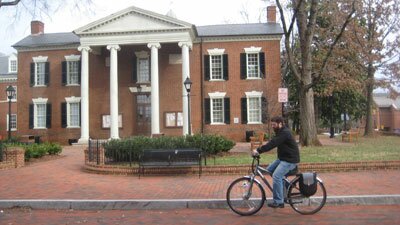GREEN HOME- eBikes: Recent advances make 'em viable for Charlottesville

Zoning administrator Read Brodhead wheels a Giant Twist Freedom out of City Hall.
PHOTO BY RANDY SALZMAN
Concerned about slowing down automobile drivers on the Belmont Bridge, City zoning inspector Craig Fabio used to avoid making his rounds on his old Schwinn. Today, however, Fabio bicycles confidently over that same bridge on his way to inspections.
The difference? Fabio now gets a boost from the City newest green addition: a pair of bicycles whose pedals literally leap when he shifts on his onboard battery pack. Rather than fight the bridge uphill, he now cruises without strain.
Fabio and his department are pioneering a new concept in electric-assist bicycles, or eBikes, which until now have been marketed almost exclusively to commuters. Charlottesville's experience checking building codes and set-back requirements suggests that eBikes may be a helpful tool for cities determined to go green and back their pledges under the U.S. Conference of Mayors Climate Protection Agreement with genuine strides in sustainability.
Although Charlottesville has no plans to study the congestion, pollution, or global warming effects of two men performing their jobs from bicycle seats, the former Charlottesville mayor and current city councilor who signed the Agreement points to that message sent to citizens from seeing city officials traveling on two instead of four wheels.
"In the same way the City has tried to set an example for green buildings," says City Councilor David Brown, I would hope that we can set an example in all the areas we can, like transportation, and the use of eBikes. The nicest thing is that people will see the bikes and see how they're being used. Just that works for me."
Meanwhile, over in Ivy, a mid-January day blooms into a beautiful afternoon, prompting Lionel and Claire Metz to climb on their eBikes and pedal six miles to pet some llamas.
Passing other retired couples out walking in their Peacock Hill neighborhood, a place of three-acre lots and half-million-dollar homes, the Metzes zoom up hills and pass teenagers taking dogs for a run. There are real hills along the tiny back-country roadways of their America exurbia, yet the Metzes roll up each one with minimal exertion.
Like an ever-growing number of American retirees, the Metzes have discovered eBikes and the ease which keeps even 86-year-old Lionel outdoors getting moderate exercise– movement he desperately needs after two years of battling kidney and bladder infections and eventually prostate surgery.
"I'd always been fit," says Lionel, a former pilot, "but then all the infections took my muscles from me. Now, I think that with these bikes– and no other illnesses of course– I can go on cycling until I'm 90 or 100."
Claire, 24 years younger than her husband, is a young-looking 62, so it's easy to imagine her pedaling 25 miles on one of her favorite rides. First hearing about electric bikes from her family in the Netherlands, she originally balked over the $1700 price tag of the least expensive model available locally, but Lionel's need quickly overcame that hurdle.
Their Giant Twist Freedom bikes weigh 50 pounds– thanks to lithium-ion batteries which reportedly suffer no memory affects. Li-Ion batteries generally trickle-charge for three to five cents per charge, are recyclable, and have been labeled "non-hazardous" by the EPA.
If both Li-Ion batteries are charged and operating in "economy mode," the Twist Freedom has a range of 70 miles on flat ground and about 50 in the hills. With three adjustable settings, the batteries assist only while the rider is pedaling.
While U.S. sales lag far behind Western Europe, where 850,000 eBikes are expected to roll out of showrooms this year, the surprising market of the affluent elderly multi-tasking issues of health, global warming, foreign policy, and congestion with day-to-day fitness and physical recovery might lead to a surge in American eBike sales.
"Not unlike easy-fit jeans, these bikes are increasingly being adjusted to accommodate a willing and wealthier costumer seeking the aura of the outdoor mountain-biking experience without the arduous exertion and discomfort," marketing consultant Steven Greene reported last summer.
eBikes have been around commercially since 1994– I imported an early lead-acid battery model for my wife three years ago. Today, however, the better batteries and a return to multi-speed internal gear hubs (which all-but disappeared from bicycles four decades ago) have set the stage for a potential sales spike.
Italy, for example, recently announced a kind of "cash4clunkers" project in which the government will refund up to 30 percent of an eBike's price. Paris did much the same, except the city's subsidy tops out at 400 Euros. In the U.K., eBike sales jumped 45 percent last year, and in China (where over 90 percent of eBikes are purchased and produced), eBike sales are twice the number of automobile purchases which themselves literally doubled in 2009– 62 million eBikes sold since 2006.
On this continent, Wal-Mart and Best Buy have begun offering a model for under $600, a price point that enters the realm of reality for average citizens.
"It is not news that increasing urbanization, traffic congestion, parking congestion, and resource limitations mean that more humans will move on two wheels, worldwide, than on four," writes Ed Benjamin, chairman of the year-old Light Electric Vehicle Association in Maine, who calls himself "professionally optimistic."
But it wasn't optimism that brought the Metzes and a city official into the Berkmar Drive retailer Charlottesville Bike and Tri on the same day in November 2009. That coincidental meeting came from hard-headed realism.
The Metzes knew that after Lionel's health issues, he needed simple and easy movement; and the City's zoning department had originally wanted Segways (whose starting price tops $5,000), but in doing the homework concluded that eBikes provide more bang for the taxpayer buck.
The optimism centered in the person of store owner John Lawler III, who had carried eBikes for a year with only one sale. Though he's since sold another (to a man looking for a Christmas gift for a retired wife), the City's interest was a first noteworthy sign of what could be a bright future.
"People had been curious, but nobody had pulled the trigger," Lawler remembers. "It's still virgin territory, and right now we're still cautious. A lot of people don't want to be the first, but once they see people riding them, I hope eBikes will catch on."
It helps that Lawler is not the typical bike shop employee. With gray hair and a bit of a gut, plus a background in convenience store marketing, he is a bicyclist but not a devotee of Lance Armstrong and the Tour de France. Armstrong, beloved by almost every American bike enthusiast including the vast majority of bike shop employees, has literally said that he rides "not for the pleasure, but for the pain."
So typical bicycle shop employees, prone to hard workouts and weekend racing, may find themselves conflicted in promoting the ease of climbing hills and joys of not sweating– the two primary selling points of eBikes and the reason they are today the commute vehicle of choice in the Far East.
"Here, it saves time," says Charlottesville zoning administrator Read Brodhead, "especially when the inspection is six or seven blocks away. It saves four minutes just getting to the parking lot."
Whether responding to neighborhood complaints or needing to issue a Certificate of Occupancy, Brodhead's employee Fabio finds that he can quickly slip into busy commercial areas like The Corner where finding a parking space used to consume his time.
"An urban environment works quite well for these," says Fabio. "I can't pick up all the illegal signs like I used to, and people say, ‘That's your city work vehicle?' But now all I need to do my job is this," he says, pointing to his Blackberry device, "and my bike. That's pretty convenient."
Fabio and Brodhead expected short range, as they figured Charlottesville's hills would decrease their 40-mile battery maximum, but they hadn't recognized an odd public relations problem which the eBikes solve. Unlike their colleagues in an electric truck, which tops out at 25 mph and backs up traffic, cars can slip by eBikes so harried drivers don't get upset.
Furthermore, if they do ever run out battery power, the eBikes are still bicycles; so, although heavy, they can be pedaled back home or to City Hall. And with City permission, both men periodically commute on the eBikes, Fabio only a couple miles but Brodhead over ten miles each way.
"The one downside is that the commute takes me 45 minutes, and if I drive it's 25 or 30 minutes," says Brodhead, "but at the same time, I'm getting my workout in, and I'm not itching to leave my family and go to the gym."
Brodhead says the zoning department has long been a complaint-driven office. "But now that we have the opportunity to get some fresh air," he says, "we might be a little more inclined to be proactive."
Though no benefit-cost analysis is in the works, Department head Jim Tolbert predicts at least $1,000 in annual gas savings and notes that the purchase price of both bikes was roughly what the city annually spent maintaining Brodhead and Fabio's old vehicle, a 1994 Ford Taurus. And he sees other unquantifiable benefits as well: decreasing the need for parking in the city garage and promoting employee health.
"You've got to get out of the mindset that your zoning inspector comes to work in a button-down shirt and tie every day," Tolbert laughs. "Next thing you know, we'll get them some of the sexy bike pants like the cops wear."
Read more GREEN HOME–Stop recycling! Local haulers want to do it for you
You’ve been doing it for years–-dutifully separating recyclables from your trash, rinsing jars and removing caps, tying your cardboard, and placing them in the assigned bin if you use the City’s curbside service; the guidelines for which you have memorized. READ MORE

City zoning inspector Craig Fabio saves money by storing his vehicle right inside his City Hall office.
PHOTO BY RANDY SALZMAN

Claire Metz (shown here) and her husband Lionel zip through their Peacock Hill neighborhood on eBikes.
PHOTO BY RANDY SALZMAN

"People say, ‘That's your city work vehicle?" says Fabio, shown here cruising through Court Square.
PHOTO BY RANDY SALZMAN
#